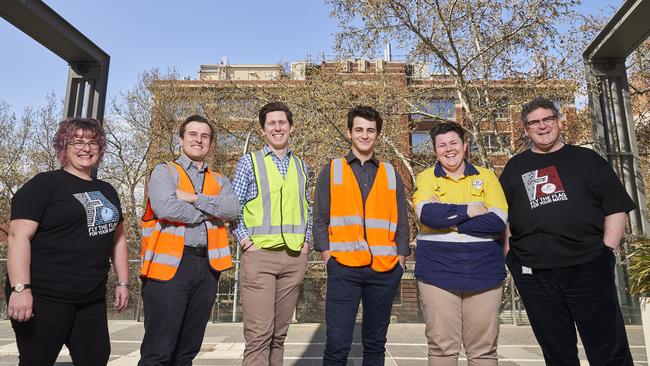Building skills to help cut construction industry’s grim suicide toll
Suicide rates among construction workers are staggeringly high in Australia – so what can the industry do?
Lifestyle
Don't miss out on the headlines from Lifestyle. Followed categories will be added to My News.
The ‘Are you okay?’ conversation is one of the most important lessons now being taught to all construction management students at UniSA.
One construction worker takes their own life every 48 hours in Australia and they are six times more likely to die from suicide than a workplace accident.
It’s a statistic made all the more sobering in the shadow of a global pandemic, said Anna-Clare Longford – the state’s first female carpentry apprentice and UniSA lecturer.
Ms Longford saw a gap in mental health awareness in the industry, so embedded the MATES in Construction suicide-prevention training program in the Bachelor of Construction Management degree in 2019. So far, more than 250 first-year students have been trained.
“I do believe this (suicide prevention) training will save lives,” said Ms Longford.
Among her students benefiting from the mental health training is 19-year-old Antony Peppas, “The construction industry can be an isolated occupation, often with heavy stress loads and time pressures so it’s really important that workers feel supported in difficult times and know that their mental health does not need to be sacrificed,” he said.
The Advertiser’s Let’s Talk Mental Health Campaign earlier this year reported one in four South Australians who took their own life in the past 10 years had worked in the construction industry.

UniSA’s city campus is one of 94 sites in SA that will on Thursday mark the annual MATES in Construction “Fly the Flag Day”, held in conjunction with R U OK Day – a national suicide prevention charity event encouraging Australians to connect and support someone who is struggling. Friday is World Suicide Prevent Day.
UniSA Professor Nicholas Procter, who heads the Mental Health and Suicide Prevention Group, said asking the important questions – are you okay? – was “so important” because it was an “opportunity to interrupt the suicide trajectory”.
“Suicide prevention is best achieved when individuals and communities including those outside of the health sector play a part in understanding and responding to a person in distress,” said Prof Procter.
For help call MATES in Construction’s 24/7 free helpline on 1300 642 111, Lifeline on 13 11 14, or Beyond Blue on 1300 22 4636.





